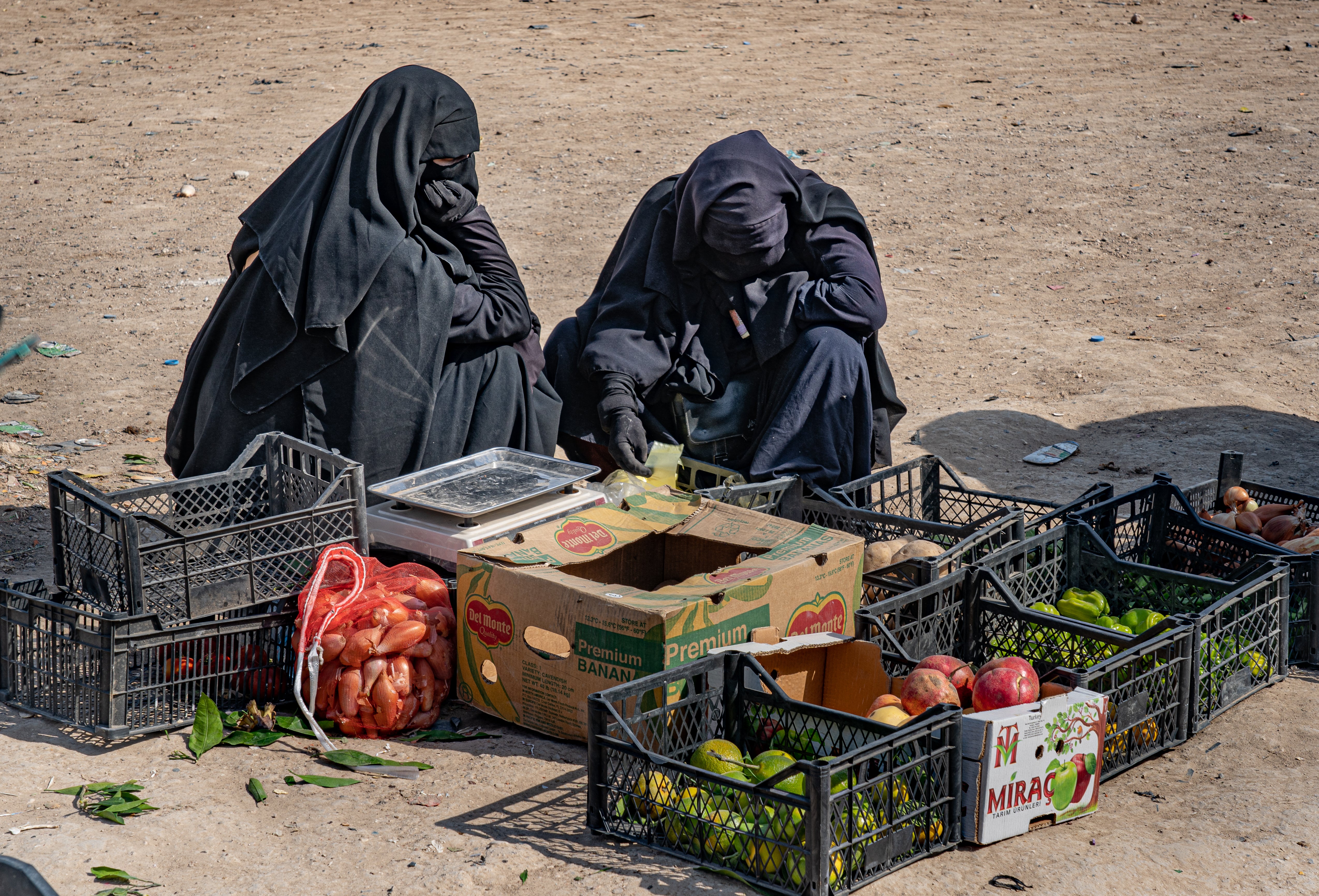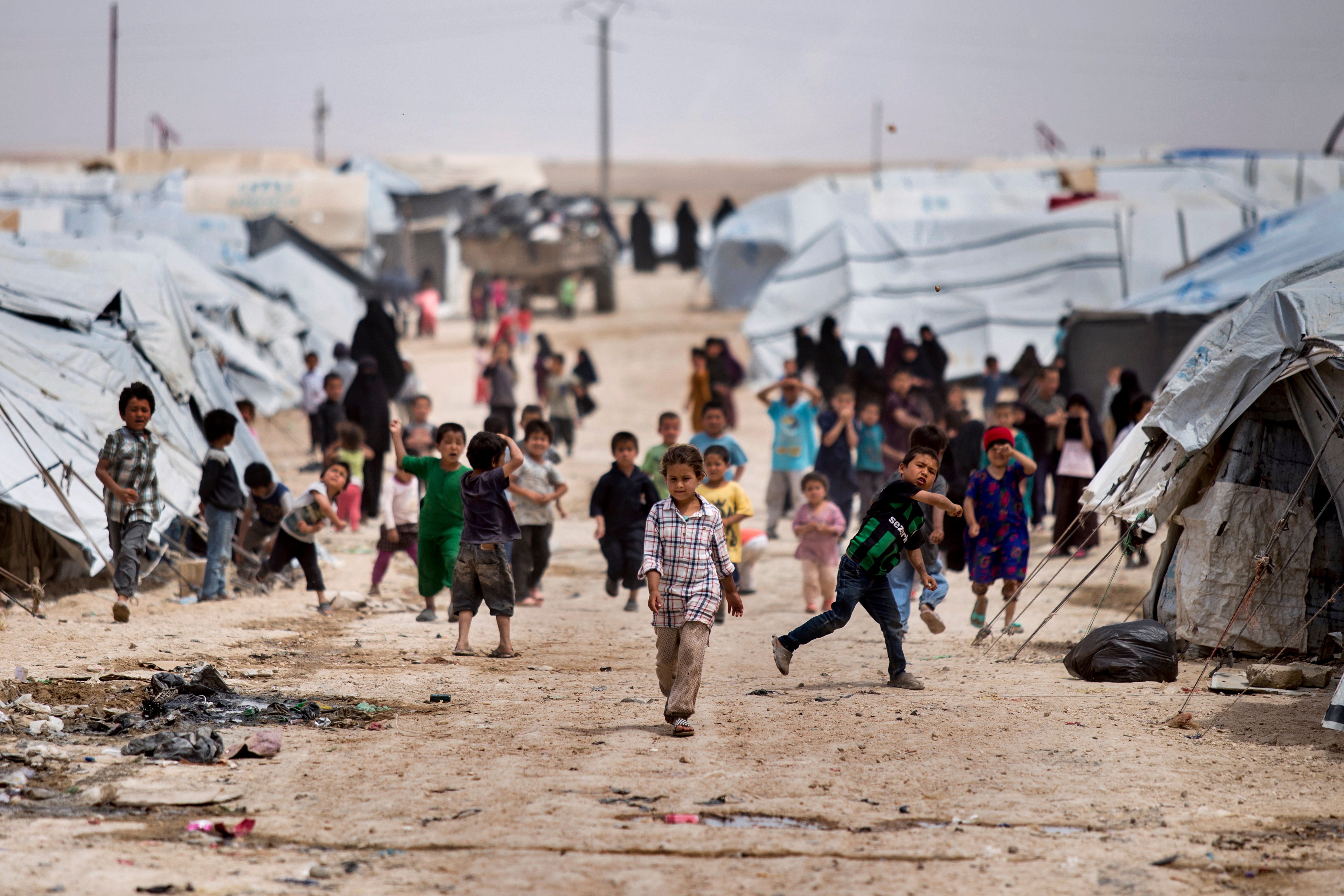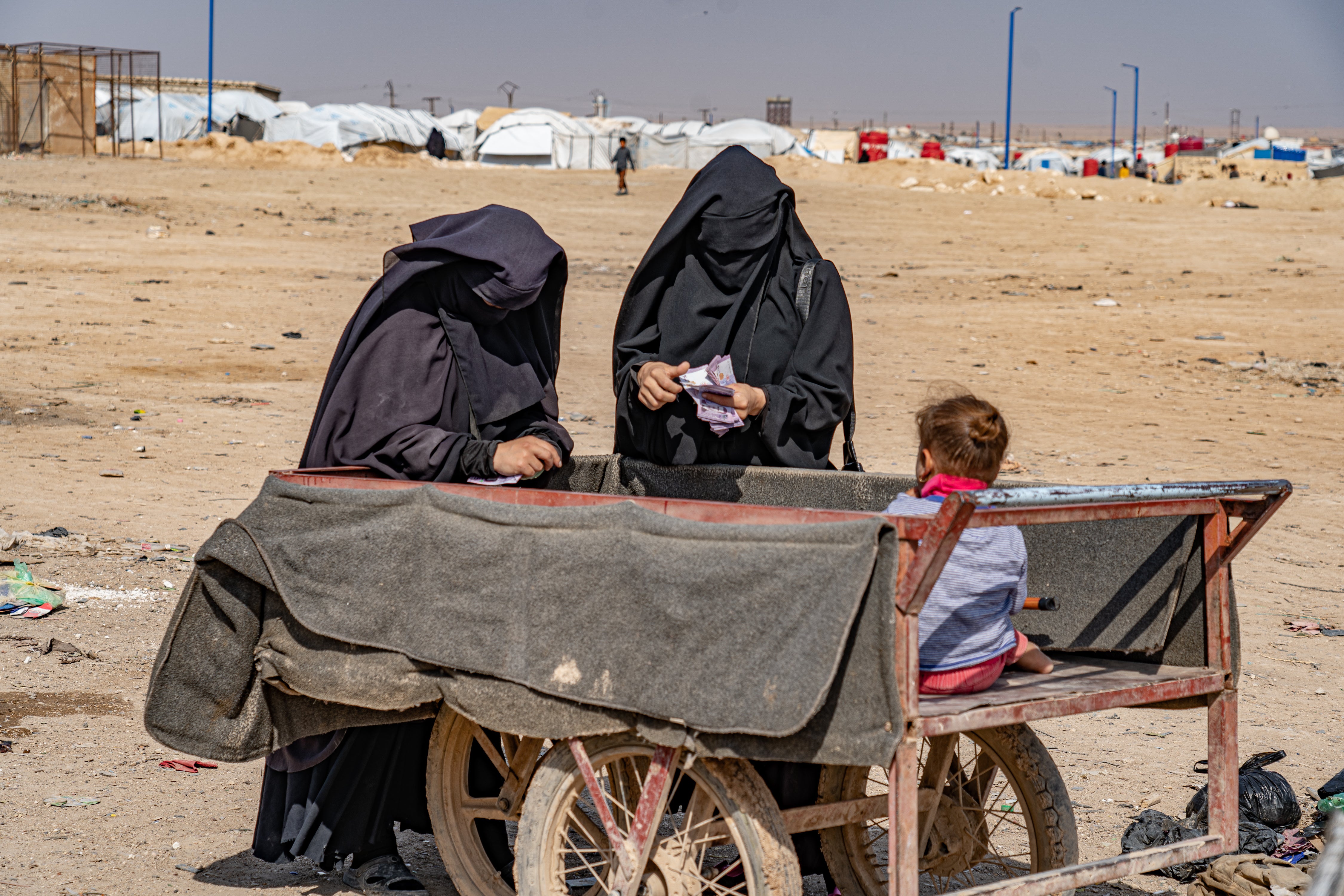Inside the ‘deadliest place on earth’: Murders surge in Syrian refugee camp stalked by Isis
Unprecedented violence is unfolding at Syria’s al-Hol camp where residents live in fear, reports Bel Trew


Your support helps us to tell the story
From reproductive rights to climate change to Big Tech, The Independent is on the ground when the story is developing. Whether it's investigating the financials of Elon Musk's pro-Trump PAC or producing our latest documentary, 'The A Word', which shines a light on the American women fighting for reproductive rights, we know how important it is to parse out the facts from the messaging.
At such a critical moment in US history, we need reporters on the ground. Your donation allows us to keep sending journalists to speak to both sides of the story.
The Independent is trusted by Americans across the entire political spectrum. And unlike many other quality news outlets, we choose not to lock Americans out of our reporting and analysis with paywalls. We believe quality journalism should be available to everyone, paid for by those who can afford it.
Your support makes all the difference.The gunman arrived on a Friday afternoon and shot dead two of Sara’s relatives in broad daylight, as crowds returned from the mosque in a refugee camp in northeast Syria.
With Leila, the attackers came in the middle of the night. They murdered her husband lying in the tent alongside her as she, heavily pregnant, tried to sleep in the heat.
The relatives of these Syrian women are unconnected but they all live in the Kurdish-run al-Hol refugee camp, where crime, violence, and deaths are soaring as officials struggle to contain what they say is the growing influence of the Islamic State (Isis) and factions within the facility.
The now infamous tent city is home to nearly 60,000 Syrians and foreigners, including family members of Isis fighters, adherents of the group, or people who fled the collapse of the caliphate almost three years ago.
Violence there has reached unprecedented levels: the loved ones of Sara and Leila are among at least 81 people camp officials say have been killed to date in 2021.
In fact, international rights groups, whose own staffers and centres have been targeted, say al-Hol has been bloodier this year in terms of murders per capita than Caracas in Venezuela, the world’s deadliest capital.
The surge in assaults, attempted beheadings, extortion, theft, arson, and murders has prompted the Kurdish authorities to call for a major but divisive security restructure, and warn the international community that they need help to stop further bloodshed.
“Anyone perceived to be working with camp administration is at risk,” says Sara, whose name has been changed for her safety. “My father-in-law was murdered because he was part of an al-Hol council,” she adds, explaining that she knows 13 Syrians who have been killed this year alone.
The exact motives for the murders are unknown. Camp officials and some residents believe Isis militants and their supporters are behind the majority of the killings and have claimed al-Hol is part of the group’s efforts to recruit, generate income, and even plan attacks abroad after their caliphate was crushed in 2019.
Sara isn’t sure but says the murders of her father-in-law and brother-in-law were part of a slew of attacks on camp inhabitants accused of working with the Kurdish-led authorities.
There is a pattern: among the recent murder victims in al-Hol are policemen, family members of charity workers operating in the camp, and locally appointed camp community leaders.
“When the camp’s guards caught the attacker they found a message on his mobile that read ‘the operation is done and was successful’. Other names of people the council were mentioned as targets,” Sara says.
Leila’s husband, who is from Idlib, scraped a living by using a smuggled laptop to burn cartoons onto DVDs that he sold in the camp. While she does not know why he was murdered in May, the fact he ran a business suggests extortion as the motive.
“They shot him in the head without saying a word,” the mother-of-four says, her voice wobbling.
“I am so scared and alone. The situation is horrendous, we are all frightened,” adds Leila, whose name has been changed.

Al-Hol is not a welcoming place.
The peaks of the tents emerge through the haze like scales along the back of the horizon of this lonely patch of desert in Syria’s Al-Hasakah Governorate, a region bordering Iraq.
Security forces stand guard along the concentric snarls of barbed wire. Inside the camp, black-clad residents move through the maze in the scorching heat. The air crackles with tension. In an annexe reserved for third-country nationals, some children of foreign Isis families throw stones at visitors. In the main part of the camp, outsiders are watched with distrust.
In many ways, the story of this camp reflects the violent history of the region. It was first established in 1991 for Iraqi refugees in the Gulf War, and was later reopened for those fleeing the 2003 US-led invasion of Iraq.
As war erupted again and Isis swept through territory, a fresh wave of Iraqi refugees came to the camp between 2016 and 2017, and it also became a transit point for Syrians forced to flee their homes by the conflict.
But at the start of 2019 everything changed. As the caliphate collapsed in the space of a few months, and those living within under Isis’s rule fled the US-backed war to destroy the group, the camp’s population increased sixfold. It reached nearly twice its maximum capacity.
The overflowing camp was eventually split in two: foreigners – including Brits, Americans and Russians – were placed in a section called the annexe. Syrian and Iraqis – some of them Isis supporters, others normal civilians who had been uprooted – remained in the larger section.
Today, most of the Europeans, including all known British citizens such as Shamima Begum, have been moved to a second camp – which is smaller but more secure – called Roj. However, more than 8,000 people from nations as far away as Tajikistan and Russia remain in the annexe. While thousands of Syrians have returned home in deals brokered with local tribal leaders, nearly 20,000 are still in the main part of the camp alongside nearly 30,000 Iraqis.
Countries have been reluctant to repatriate their citizens while many Syrians are stuck. And so, over the years, living conditions have deteriorated and desperation has taken root.
Inevitably, violence has soared.
We are seeing a surge in threats to guards. They say give us money or be killed
In fact, the morning we visited the camp, the guards had found the corpse of a young woman dumped in a sewage canal of one Syrian section of the facility. She was unidentifiable as her face had been blown off by a shotgun. The motives and the murderers were again unknown.
But Kurdish officials fear that Isis is to blame, punishing perceived enemies or those who waiver from an extremist line, as well as increasingly using extortion to threaten people.
“At the beginning of the year, they tried to revive the Isis ideology of killing people and so we would find two or three bodies a day, shot or stabbed. We ended up launching a full-scale military operation,” says al-Hol’s harried administrative chief, who declines to reveal his name or appear on camera for security reasons.
He says his records show 154 people had been killed in the camp, more than 100 of them since September 2020 alone: “We are seeing a surge in threats to the guards and local people working with NGOs in the camp as well. They say give us money or be killed.”
Kurdish officials and staff working for international NGOs have shown The Independent screenshots of nearly half a dozen text messages threatening death if money, “taxes” or charitable donations are not paid.
Some of the messages explicitly reference Isis and refer to the camp administration as infidels, but The Independent could not independently verify their origin.
“We are your brothers in the Islamic State,” read one text message sent to a woman who worked as a cleaner for a humanitarian organisation in the Syrian-Iraqi section of the camp.
“Give us the amount of $300 [£225] for zakat [a form of almsgiving]. You have three days to pay.”
In another message sent from a Lithuanian number on WhatsApp, an Iraqi refugee who owned several stores in the camp was ordered to pay $8,000.
“If you neglect the Islamic State and you don’t answer or block this phone number, we will find you,” read the message, which contained the location of his tent and the name of the workers he employs. “The mujahideen are close to you, we know where you live.”

There are also active Telegram channels including one called “Hasakah Nightmare” where users share photos, addresses, and even phone numbers of people within al-Hol accused of working with the Kurds or the camp administration, or of violating extremist conservative values. The channel’s admins urge their followers to find these individuals and attack or kill them.
There have also been documented attacks on NGOs’ facilities within the camps, although the charities believe money – not ideology, religion or Isis – is the motive as conditions in the camp have reached dire levels.
At the end of August, armed men attacked one of the learning centres remotely managed by the Norwegian Refugee Council (NRC) and demanded money. No one was physically hurt but the NGO temporarily suspended operations as a result, said representative Bahia Zrikem.
“It is more dangerous (in the camp) than one of the most dangerous cities in the world.” Zrikem says, referring to the murder rate in Caracas, Venezuela.
Yet she says no one has come up with a “solution for tomorrow”, which is urgently needed before it is too late.
Vera Mironova, a visiting fellow at Harvard University and an expert on armed groups, said that while violence is mostly happening on the Syrian and Iraqi side, it is also occurring in the foreign annexe where there are ties between female residents and Isis operatives outside the camp.
Mironova has documented a number of beheading attempts in the camp, including one against a Russian woman, but said she was not sure how many of the murders were organised Isis attacks or instead criminal acts fuelled by the worsening conditions.
There are also concerns that some of the corrupt camp guards are involved, as extortion has become a lucrative business.
“How much is this about the caliphate, and how much of this is about increasing the share of the money the individual or gangs get?” Mironova asks.
“People are running out of money so there is a lot of violence. It is money-related.”
It is more dangerous (in the camp) than one of the most dangerous cities in the world
Whatever the motives, the Kurds are sufficiently concerned to have proposed a new security strategy that would divide the camp into smaller sections, each surrounded by 30 metres of heavily policed no-man’s land. The idea is controversial. Rights groups have warned it could impede humanitarian access and potentially split families up while making the refugee camp feel even more like a prison – with tensions and violence likely to worsen.
Despite these objections, Kurdish officials insist serious action must be taken. They also want countries to immediately repatriate their citizens to reduce the population and therefore pressure within the camp. If foreign states fail to do so, they will pay the price, warns Mahmoud Karrow, who heads up a section of Kurdish administration’s department for refugees.
“We are very worried about future terrorist attacks being planned from within the camp, that al-Hol camp will become an operating room for Isis’s crimes outside,” he says from his home.
“We need help. The [Kurdish-led] administration should not pay the price of terrorism alone.”
Rights groups say the longer that al-Hol is ignored, the more dangerous it will become, particularly for children, and have have repeatedly called for the camp to be shut down with families sent home safely.
Kathryn Achilles from Save the Children says children are suffering the most, and that families cannot be left in this “particularly horrific holding pattern”.
“The violence shows how unsustainable this is as a camp,” she tells The Independent. “There are ways we can safely shut it down and support people to voluntarily go home with dignity.”
Bahia of the NRC warns that the situation is putting in the “groundwork for more violence, aggression and almost certainly more terrorism”.

Back in al al-Hol, Leila is so frightened by the nightly raids and threats of violence that she refuses to leave her mother’s tent, where she now lives with her children.
Sara, meanwhile, was at such risk of violence that she was actually allowed to move out of the camp. Yet this is not a solution available to everyone. Sara says people are so desperate that they are paying thousands of dollars to be smuggled to other parts of Syria.
“Children are afraid to go to the toilet in the evening because of the killing and the constant raids,” Sara says.
“We need the innocent people to be taken out of this camp. This has to stop. This is no life.”



Join our commenting forum
Join thought-provoking conversations, follow other Independent readers and see their replies
0Comments